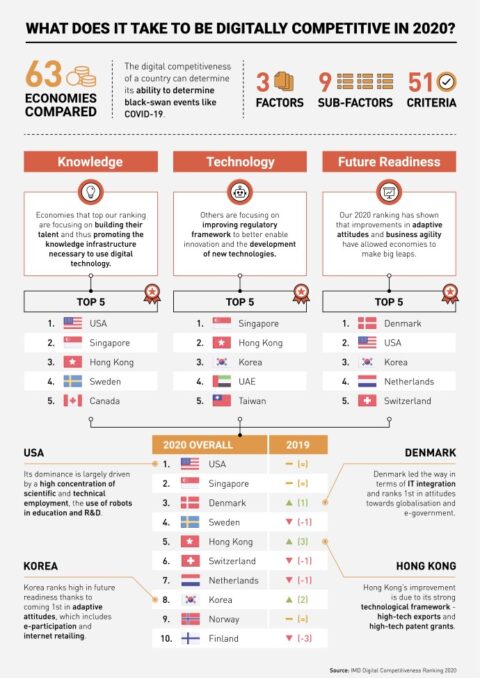The United States came first, Singapore second, and Denmark third in the 2020 IMD World Digital Competitiveness Ranking, a giant compilation of data that economists said could help predict how well economies would weather the pandemic.
Now in its fourth year, the ranking, which is produced by the IMD World Competitiveness Center (WCC) uses an array of data to understand how 63 economies employ digital technologies.
“Digitalization is no longer an option. It is a necessity,” said economist Mariana Mazzucato, Director of the Institute for Innovation and Public Purpose at University College, London.
“Setting bold national targets — including digitalizing public services —creates a dynamic process by which the private sector can scale up through servicing bold procurement programmes. Europe’s recovery will depend on it,” she added.
Knowledge, advanced technology and quick adoption
This year’s overall results show few changes in the economies placing in the top ten from last year – the US and Singapore maintained their positions at the top – but several entries lower in the top tier have traded places.
Economies adept at maintaining efficient use of digital talent, effective regulation frameworks and a quick adoption of new technologies (termed “future readiness” by the Center), were able to top the chart.
In the case of the USA, education and R&D was pinpointed by the authors as a major force behind digital growth. The USA is renowned for increasingly incorporating digital in education. It came third in adaptive attitudes and second in business agility.
Singapore comes first in the talent and regulatory framework ranking indicators; Sweden and Denmark stand out for their excellent scores in knowledge building; while Eastern Asia, Western Europe and North America are the most digitally progressive regions.
One small tap towards improving digitalization
COVID-19 has showed the importance of digitalization as one way to increase resilience. An economy’s ability to adapt new technologies quickly in response to the changing landscape that the pandemic has brought about will affect its recovery speed.
“The post-COVID world will be characterized by a K-shaped recovery, with two types of economy: those that will recover quickly and those that will recover more slowly,” said Bris.
“Recovery is driven by many factors, such as the health of public finances. But also, fundamentally, by the digital competitiveness of those economies,” he explained.
Of course, digitalization does not happen overnight. Mazzucato said she believes “it needs to be the product of long-term strategies and intra-organisational capabilities in both the public and private sectors. Indeed, without an eco-system approach, digitalization will not happen.”
The rankings are the product of a mixture of hard data and survey responses. The hard data reflects 2019’s performance whilst the survey was carried out from February to May 2020. This means disentangling COVID’s impact is not easy; next year’s ranking will tell more on the story of the impact of digital competitiveness during the pandemic.
The IMD World Digital Competitiveness Ranking is one of three perennial rankings that the WCC produces related to the competitiveness of nations.
One key philosophy behind the WCC is that when two countries become more competitive, both are better off as they improve their respective abilities to achieve long-term growth, generate jobs and increase welfare. Digital competitiveness is therefore not a win-lose game but a path towards progress.



